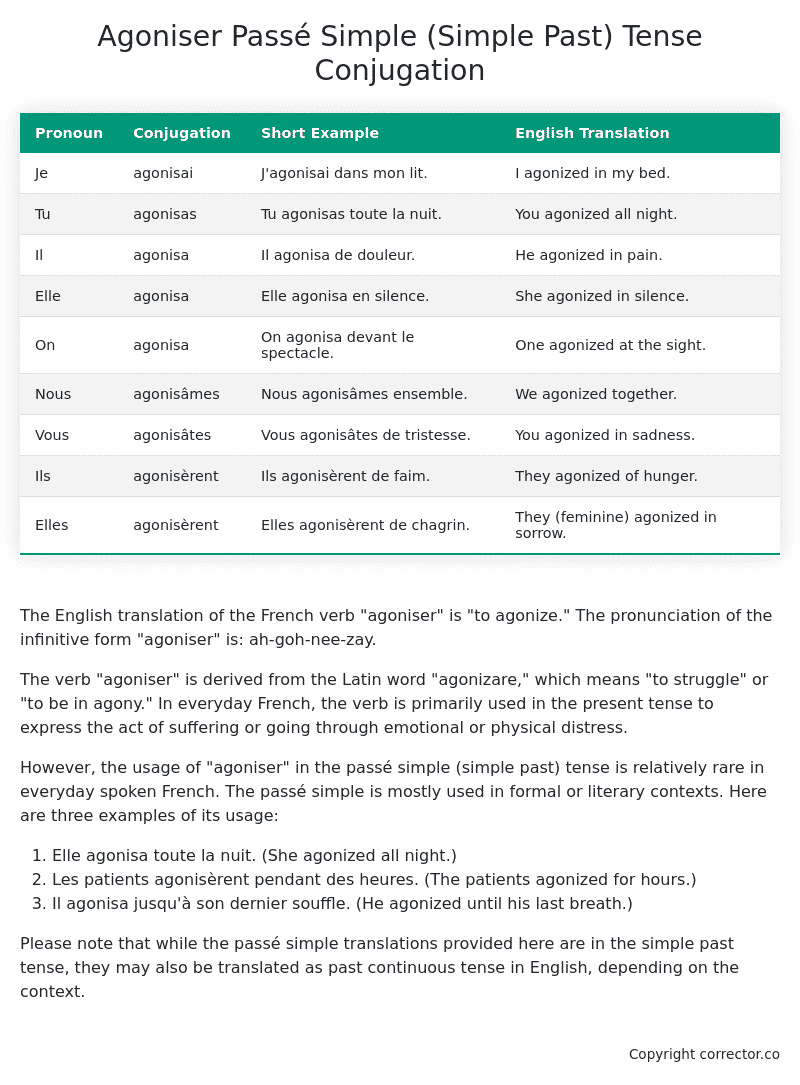Passé Simple (Simple Past) Tense Conjugation of the French Verb agoniser
Introduction to the verb agoniser
The English translation of the French verb “agoniser” is “to agonize.” The pronunciation of the infinitive form “agoniser” is: ah-goh-nee-zay.
The verb “agoniser” is derived from the Latin word “agonizare,” which means “to struggle” or “to be in agony.” In everyday French, the verb is primarily used in the present tense to express the act of suffering or going through emotional or physical distress.
However, the usage of “agoniser” in the passé simple (simple past) tense is relatively rare in everyday spoken French. The passé simple is mostly used in formal or literary contexts. Here are three examples of its usage:
- Elle agonisa toute la nuit.
(She agonized all night.) - Les patients agonisèrent pendant des heures.
(The patients agonized for hours.) - Il agonisa jusqu’à son dernier souffle.
(He agonized until his last breath.)
Please note that while the passé simple translations provided here are in the simple past tense, they may also be translated as past continuous tense in English, depending on the context.
Table of the Passé Simple (Simple Past) Tense Conjugation of agoniser
| Pronoun | Conjugation | Short Example | English Translation |
|---|---|---|---|
| Je | agonisai | J’agonisai dans mon lit. | I agonized in my bed. |
| Tu | agonisas | Tu agonisas toute la nuit. | You agonized all night. |
| Il | agonisa | Il agonisa de douleur. | He agonized in pain. |
| Elle | agonisa | Elle agonisa en silence. | She agonized in silence. |
| On | agonisa | On agonisa devant le spectacle. | One agonized at the sight. |
| Nous | agonisâmes | Nous agonisâmes ensemble. | We agonized together. |
| Vous | agonisâtes | Vous agonisâtes de tristesse. | You agonized in sadness. |
| Ils | agonisèrent | Ils agonisèrent de faim. | They agonized of hunger. |
| Elles | agonisèrent | Elles agonisèrent de chagrin. | They (feminine) agonized in sorrow. |
Other Conjugations for Agoniser.
Le Present (Present Tense) Conjugation of the French Verb agoniser
Imparfait (Imperfect) Tense Conjugation of the French Verb agoniser
Passé Simple (Simple Past) Tense Conjugation of the French Verb agoniser (You’re reading it right now!)
Passé Composé (Present Perfect) Tense Conjugation of the French Verb agoniser
Futur Simple (Simple Future) Tense Conjugation of the French Verb agoniser
Futur Proche (Near Future) Tense Conjugation of the French Verb agoniser
Plus-que-parfait (Pluperfect) Tense Conjugation of the French Verb agoniser
Passé Antérieur (Past Anterior) Tense Conjugation of the French Verb agoniser
Futur Antérieur (Future Anterior) Tense Conjugation of the French Verb agoniser
Subjonctif Présent (Subjunctive Present) Tense Conjugation of the French Verb agoniser
Subjonctif Passé (Subjunctive Past) Tense Conjugation of the French Verb agoniser
Subjonctif Imparfait (Subjunctive Imperfect) Tense Conjugation of the French Verb agoniser
Subjonctif Plus-que-parfait (Subjunctive Pluperfect) Tense Conjugation of the French Verb agoniser
Conditionnel Présent (Conditional Present) Tense Conjugation of the French Verb agoniser
Conditionnel Passé (Conditional Past) Tense Conjugation of the French Verb agoniser
Conditionnel Passé II (Conditional Past II) Tense Conjugation of the French Verb agoniser
L’impératif Présent (Imperative Present) Tense Conjugation of the French Verb agoniser
L’impératif Passé (Imperative Past) Tense Conjugation of the French Verb agoniser
L’infinitif Présent (Infinitive Present) Tense Conjugation of the French Verb agoniser
L’infinitif Passé (Infinitive Past) Tense Conjugation of the French Verb agoniser
Le Participe Présent (Present Participle) Tense Conjugation of the French Verb agoniser
Le Participe Passé (Past Participle) Tense Conjugation of the French Verb agoniser
Struggling with French verbs or the language in general? Why not use our free French Grammar Checker – no registration required!
Get a FREE Download Study Sheet of this Conjugation 🔥
Simply right click the image below, click “save image” and get your free reference for the agoniser Passé Simple tense conjugation!

Agoniser – About the French Passé Simple (Simple Past) Tense
Formation
Usage
Narration
Historical Context
Interactions with other tenses
Passé Composé
Imparfait
Conditional and Subjunctive
Summary
I hope you enjoyed this article on the verb agoniser. Still in a learning mood? Check out another TOTALLY random French verb conjugation!


